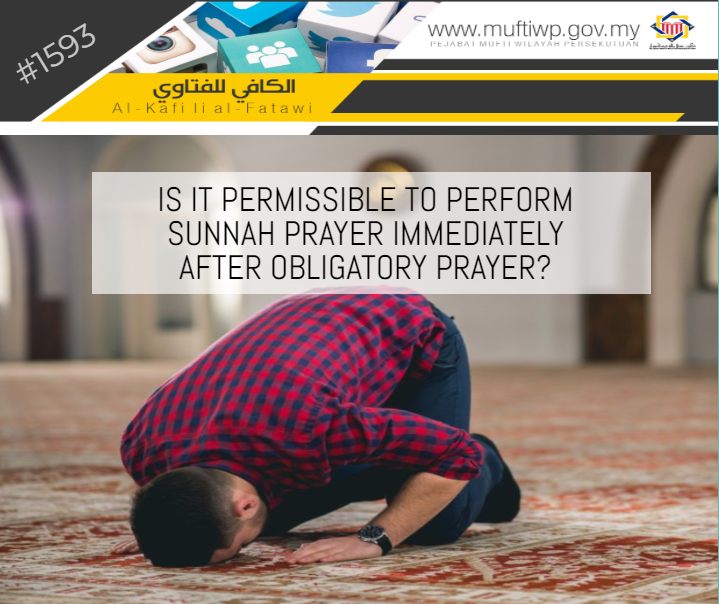Question:
Assalamualaikum, I want to ask regarding the ruling of a person who immediately stand and perform sunnah prayer after he completes his obligatory prayer. Is this permissible or should he first recite his zikr?
Answer:
Waalaikumussalam wrt wbt,
Alhamdulillah, praise and thanks to Allah for the many countless blessings He has blessed us all with. Blessings and salutations to the Prophet Muhammad PBUH, his wives, his family, companions and all those that follow his teachings to the day of judgement.
Regarding this issue, there is evidence that commanded us to separate obligatory and sunnah prayer. This in terms of the sunnah prayer is not performed through mubasyarah (immediately) after the obligatory prayer. This is as stated in a hadith narrated by Mu’awiyah bin Abi Sufyan RA, where he said:
إِذَا صَلَّيْتَ الْجُمُعَةَ فَلاَ تَصِلْهَا بِصَلاَةٍ حَتَّى تَكَلَّمَ أَوْ تَخْرُجَ فَإِنَّ رَسُولَ اللَّهِ صلى الله عليه وسلم أَمَرَنَا بِذَلِكَ أَنْ لاَ تُوصَلَ صَلاَةٌ حَتَّى نَتَكَلَّمَ أَوْ نَخْرُجَ
“Whenever you have observed the Jumu`a prayer, do not observe (Sunan prayer) till you, have talked or gone out, for the Messenger of Allah (ﷺ) had ordered us to do this and not to combine two (types of) prayers without talking or going out.”
Sahih Muslim (883)
According to the above narration, we can extract several wisdoms that we simplify into the following points:
- First, the word Friday prayer in the hadith is just an example. For in reality, all prayers are included in the prohibition of combining them with prayer following it without any separation.
This is clear through the words لاَ تُوصَلَ صَلاَةٌ used where the word prayer here is nakirah that came after la al-nihayah (prohibition). Thus, the phrase has a general meaning which includes all prayers.
- Second, the prohibition in the hadith does not mean that it is haram. Consequently, it means makruh tanzih as stated by jurists.
- Third, the commandment in the hadith has a mustahab (permissible) meaning and not wajib.
- Fourth, the wisdom behind the commandment to separate the obligatory and sunnah prayers with words or go out is stated by Imam Ibn Battal: “Since the Friday prayer is two rakaat and what is perform after it is the same (in terms of the number of rakaat), it is feared that people might think that it is a part of the Friday prayer.”
Refer Syarah Sahih al-Bukhari, Ibn Battal (2/526)
- Some scholars hold the opinion that the meaning of the phrase حَتَّى تَكَلَّمَ (until you talked) refers to the conversation between people. We state that conversation between people is a clear indication that he is no longer praying for it is impermissible to talk in prayer. Thus, this action is a clear separation between the prayers.
- While for the word تَخْرُجَ (you go out) in the above hadith has two meanings which is to go out of the mosque or move some distance away from the place the obligatory prayer was just performed.
Syeikh Badruddin al-‘Aini said: “This hadith shows that the act of moving away from the place the obligatory prayer was just performed to perform the sunnah prayer is encouraged. And it is prioritized (afdhal) to go back home and perform the sunnah prayer at home. If this is not possible, then he can move to other parts of the mosque to perform it.” Refer Syarah Sunan Abi Daud, Al-‘Aini (4/473)
- Then there are two options that a person can choose from. He can either talk to someone or move away from the position he performed his obligatory prayer at to perform sunnah prayer and this is prioritized. And the most prioritized way is for him to perform sunnah prayer at his house. This is in accordance with a hadith narrated by Zaid bin Tsabit RA, he said the Prophet PBUH said:
فَإِنَّ أَفْضَلَ صَلاَةِ الْمَرْءِ فِي بَيْتِهِ، إِلاَّ الصَّلاَةَ الْمَكْتُوبَةَ
“For the best prayer of a person is that which he prays in his house except the compulsory prayers."
Sahih al-Bukhari (7290)
Imam al-Nawawi when explaining the wisdom of why it is encouraged for a person to move away to another place to perform sunnah prayer states:
فَإِنْ لَمْ يَرْجِعْ إلَى بَيْتِهِ وَأَرَادَ التَّنَفُّلَ فِي الْمَسْجِدِ يُسْتَحَبُّ أَنْ يَنْتَقِلَ عَنْ مَوْضِعِهِ قَلِيلًا لِتَكْثِيرِ مَوَاضِعِ سُجُودِهِ
If a person did not return to his house and wanted to perform the sunnah prayer in the mosque, then it is sunnah for him to move from his place (the place he performed his obligatory prayer) to increase the place of his prostration.
He further states:
فَإِنْ لَمْ يَنْتَقِلْ إلَى مَوْضِعٍ آخَرَ فَيَنْبَغِي أَنْ يَفْصِلَ بَيْنَ الْفَرِيضَةِ وَالنَّافِلَةِ بِكَلَامِ إنْسَانٍ
If he does not move away, then he should separate his obligatory prayer and sunnah prayer by talking to another person. Refer Al-Majmu’ Syarah al-Muhazzab, Al-Nawawi (3/491)
Conclusion
To conclude, we would like to state that it is makruh (undesirable) for a person to immediately stand and perform sunnah prayer after obligatory prayer without separating the two prayers with a conversation with others or moving away from the place. It is best for a person to move to another place to perform sunnah prayer or talk to another person or perform the sunnah prayer at his house as stated in the hadith of the Prophet PBUH.
Lastly, we pray that Allah SWT gives us the correct understanding in religion. Amin.


